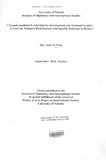| dc.description.abstract | This study exammes the place of transformational leadership for development and
national security of nations, with specific attention to the role that women participation
can contribute to the process. In examining this, the study analyses the place of
leadership in bringing about desired change in the, welfare of citizens and members of the community. It analyses traditional leadership models that have been dominated by men,and especially in the context of the newly independent nations in Africa, and the failure of the leadership to bring improvements in the lives of their people. It argues that these leaders were, in the main, more interested in securing their own positions rather than serving the people they led. In so doing, many enriched themselves at the expense of the citizenry, a situation that has persisted to this day. Women were marginalized in overall leadership in the new Africa, and this situation persists today, where decision-making and political leadership has remained in the hands of men. Africa has just produced the first elected woman President, and the numbers of women in Parliament and other organs of governance remains small.The study demonstrates that women have borne a disproportionate share of the pains of underdevelopment and disease, including HIV/AIDS. It argues that this same maternal instinct and proven capability to bring a leadership that transforms may be what Africa needs in dealing with the challenge of under-development and conflicts over resources, economic opportunities and the distribution of wealth. In many countries, the majority live in poverty, while the rich minority enjoy the lifestyles of the wealthy, and this ferments insecurity. Many conflicts in Africa, and in Kenya have been borne of conflicts over resources and opportunities, and national security will continue to be elusive until these disparities are handled. Traditions, cultures and legal structures have hindered the emancipation of women, yet their full participation brings in a major capable resource to the economies in African nations. Their emancipation will therefore be the emancipation of the nations, but traditions and legal hindrances will have to be identified and removed. | en |

